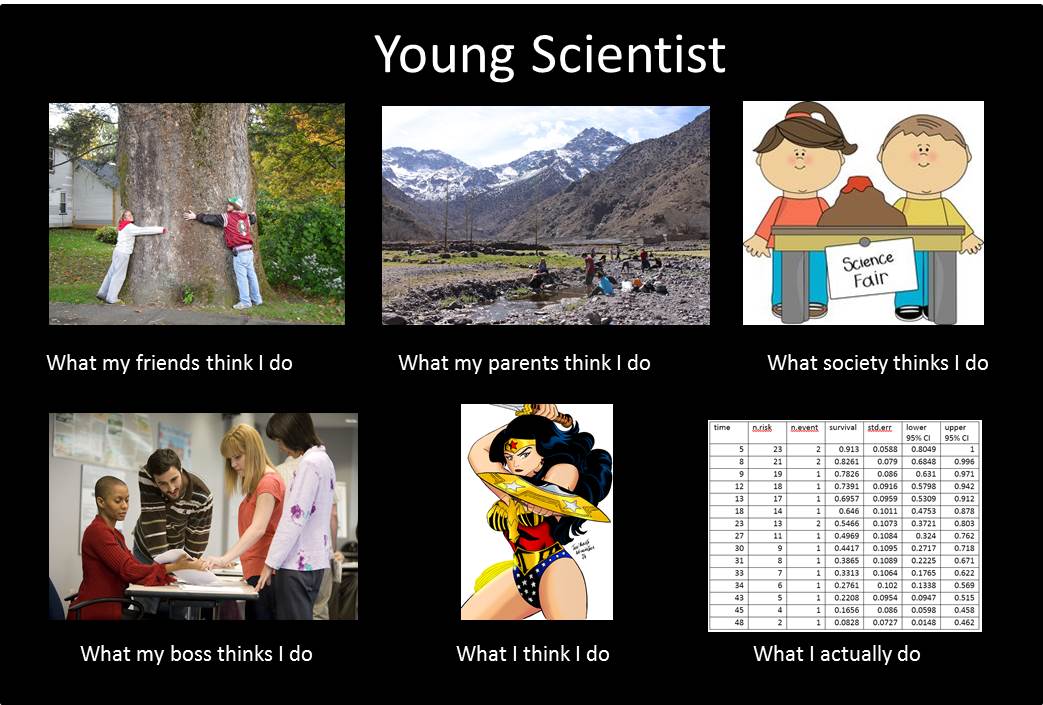Practical Advice for Millennial Scientists

By Makeya Karlie, ACDI intern 2016
Being a young and fresh-faced scientist can sometimes make one feel like one’s treading water. Here’s a little bit about my experience during my first year since graduating from university as I describe what it’s like being exposed to a new working environment, and in some ways a whole new world as well. I hope by highlighting some of my challenges, some uncertainty and worry for upcoming graduates and newbies to the world of work can be overcome and that my insights can be helpful.

Baby steps…
Once you have secured a job, one of the main concerns of what to do after graduation has been addressed and you cannot help but feel particularly pleased with yourself, right? But for me barely an hour later those feelings went straight out the window. Cue: emergency, panic and uncertainty. What if I am not skilled or smart enough? What if I don’t fit in with these people? What will the atmosphere be like? Will four years of theory and practice be enough in the real world? What does it mean to be a scientist in Africa, and South Africa particularly?
Obviously, on my first day of work as a new intern at the African Climate & Development Initiative I had sweaty palms (so sweaty, in fact, that I literally got shocked when touching the door handles!). Now, when people tell you “you will be fine, don’t be nervous, this happens to everyone,” it really does little to ease the mind, and when I walked into my new job the only thing that kept me from zombie status was keeping in mind that everybody starts somewhere and that a positive mind-set combined with an eagerness to learn, could only count in my favour. Seven months later, and I can tell you that I have indeed faced several challenges, which luckily for me have only helped me grow and flourish. A simple truth: with time you will learn, and may even find where your passion lies. Don’t sweat it, though: one of the perks of being an intern is having a little time to figure out the rest. Don’t pressure yourself to decide your whole future in a year.
Juggling Act.
During an interview it is the norm to put your best foot forward, highlighting your good organisational skills, exceptional time management, ability to be a great team player, etc. The truth is you might have been excellent at all of this previously, but with a new job comes new added pressures, responsibilities and deadlines. From personal experience I can say pulling university stunts, such as an all-nighter to make your deadline in the morning, simply won’t work anymore. Throw in travelling time to work, using your brain power on overdrive for 8 hours and time with your crazy family, and bam! You’re overwhelmed and simply trying to keep up with little tasks, struggling to see the big picture. For this, it might be helpful to take note of the little tasks your boss, mentor or manager may have for you, no matter how big or small. Keeping a time sheet or even an activity register will help you stick to dates, remember certain deadlines or even remind you when your next Red Bull break is due. Another great thing to do is make specific folders for your emails and arrange them accordingly for particular tasks or projects, which can be a great time saver and will prevent accidently deleting vital information.
A little indulgence
In the midst of #FeesMustFall protests, #ScienceMustFall debates and talks about transformation in the workplace, your burgeoning science career can become a little stressful. A great way to calm yourself could be through doing a MOOC (‘Massive Open Online Course’). This is a great way to gain knowledge, be it in a secret passion of yours or to simply keep up-to-date in advancements in your field and in addition receive valuable recognition from these courses. Remember during your studies when your parents use to have rules about no phones and social media? Well, that time is now long gone as social media now plays a huge role in science communication, and can be useful when used effectively. Social media offers us a platform to share vital information and stay on top of changes in the field of climate change globally. It can also be a great tool for connecting with people and letting others know about your research.
Closer to home
In my community, Mitchells Plain, speaking to some people revealed that everyone had the basic idea of what climate change is and its implications, but some members also highlighted the need for more and better information so that they can be properly informed about the phenomenon. Having knowledge in the field of climate change, can make one worry that one is not making enough meaningful contributions personally and professionally to help the issue. Whilst I am currently involved in the field of climate change, my hope as a young scientist would be to help disseminate vital information to my community and as many others as possible, so we can all make the necessary changes and informed decisions for future generations regarding the issue of climate change.
In conclusion, I hope my tips may be of use to those pursuing a career in science, and shown that a little patience, planning and motivation can go a long way. For me the next step is using everything I have acquired so far on my journey to enhance my career and start giving back to my community.
Image credit: Makeya Karlie
Thumbnail: Flickr
Disclaimer: The views expressed here are solely those of the author in her private capacity